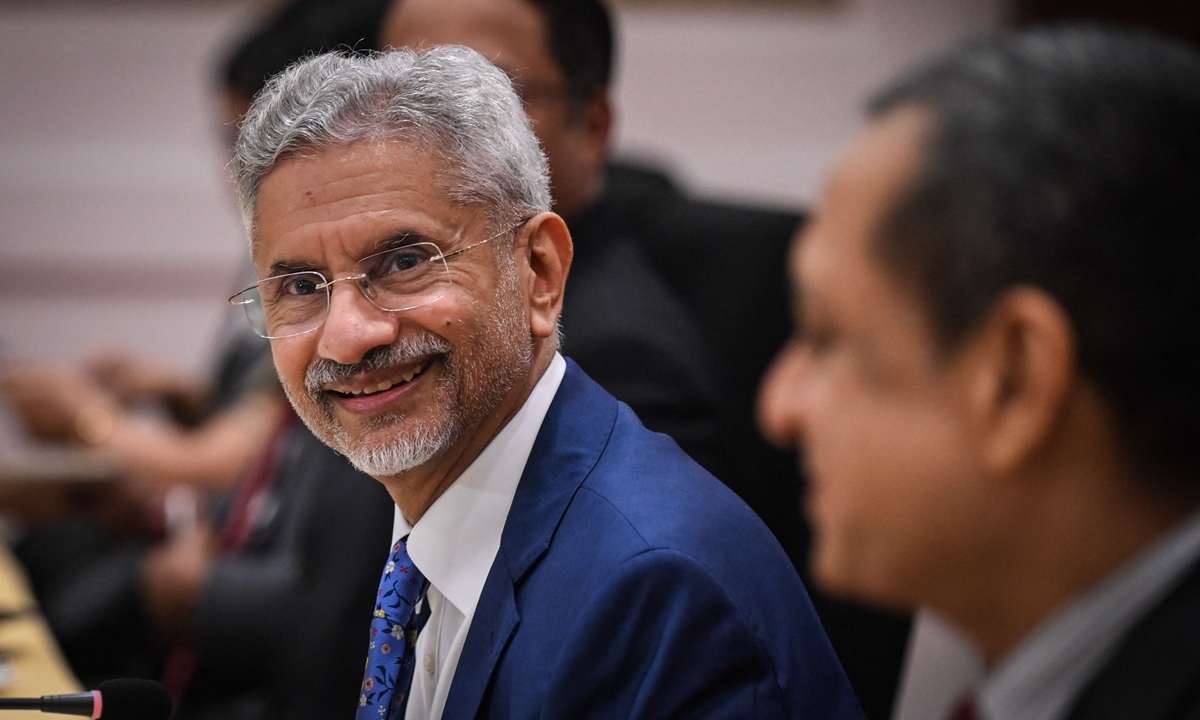
Subrahmanyam Jaishankar retains his position as India's External Affairs Minister in Prime Minister Narendra Modi's administration in his new term. Photo:VCG
With Subrahmanyam Jaishankar retaining his position as India's External Affairs Minister in Prime Minister Narendra Modi's administration in his new term, Chinese experts are not expecting a significant shift in India's foreign policy. Still, India is urged to send positive signals on China-India relations and form a synergy in improving bilateral relations as China does, observers said.
On Tuesday, Chinese Premier Li Qiang sent a congratulatory message to Narendra Modi on his new term as prime minister of the Republic of India, in which he said that the sound and steady development of China-India relations is not only conducive to the well-being of the two peoples, but also injects stability and positive energy into the region and the world.
China is willing to work with India to push forward bilateral relations in the right direction, he said.
The Chinese Premier's message was sent on the same day that Jaishankar assumed office as India's External Affairs Minister for the second consecutive term upon Modi's re-appointment. On the day, Jaishankar told Indian reporters that India's focus with regard to China will be on how to resolve the remaining issues along the border.
Analysts have pointed out that
Jaishankar has been reiterating India's desire for the resolution of remaining issues with China with a seemingly positive stance on several occasions recently, although his continuous exaggeration of this issue constantly hinders the normal development of diplomatic relations.
"The border dispute between China and India is not a recent issue, but has existed for decades," Long Xingchun, a professor at the School of International Relations at Sichuan International Studies University, told the Global Times on Wednesday.
"However, in the past few years, India has taken a series of anti-China measures in domestic policies, including suppressing Chinese companies, suspending visa issuance, and vigorously suppressing people-to-people exchanges, showing a completely negative attitude," he noted.
Observers remain relatively pessimistic about a significant shift in India's foreign policy in the near future, citing that Modi has largely retained the same senior officials in his new administration.
In the past five years, India has adopted a tough diplomatic stance toward China, partly to align with the US' strategy and partly because India is intending to reshape its nationalistic views among its nationals, thus needing an imaginary external rival, Long told the Global Times. "So far, we have not seen any proactive and practical desire from India to improve China-India relations."
In the meantime, while India has continued releasing negative signals and pressurizing China, Beijing has consistently been sending out positive signals, which was also emphasized in Premier Li Qiang's latest congratulatory message, Long said. "India is urged to work with and form a synergy with China in developing bilateral relations."
However, if in Jaishankar's next term of office as external affairs minister, his attitude remains unchanged and he continues to demand that China make further concessions, China may also take countermeasures, Long warned.
As Jaishankar underscored the importance of India's "Neighborhood First" foreign policy on taking office, observers noted that India's prioritizing of neighboring countries does not necessarily show respect for many of them, when many of India's series of attempts to expand its influence in South Asia have sparked strong discontent among neighboring countries.




